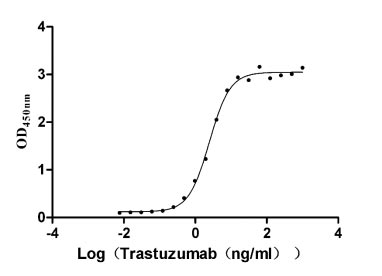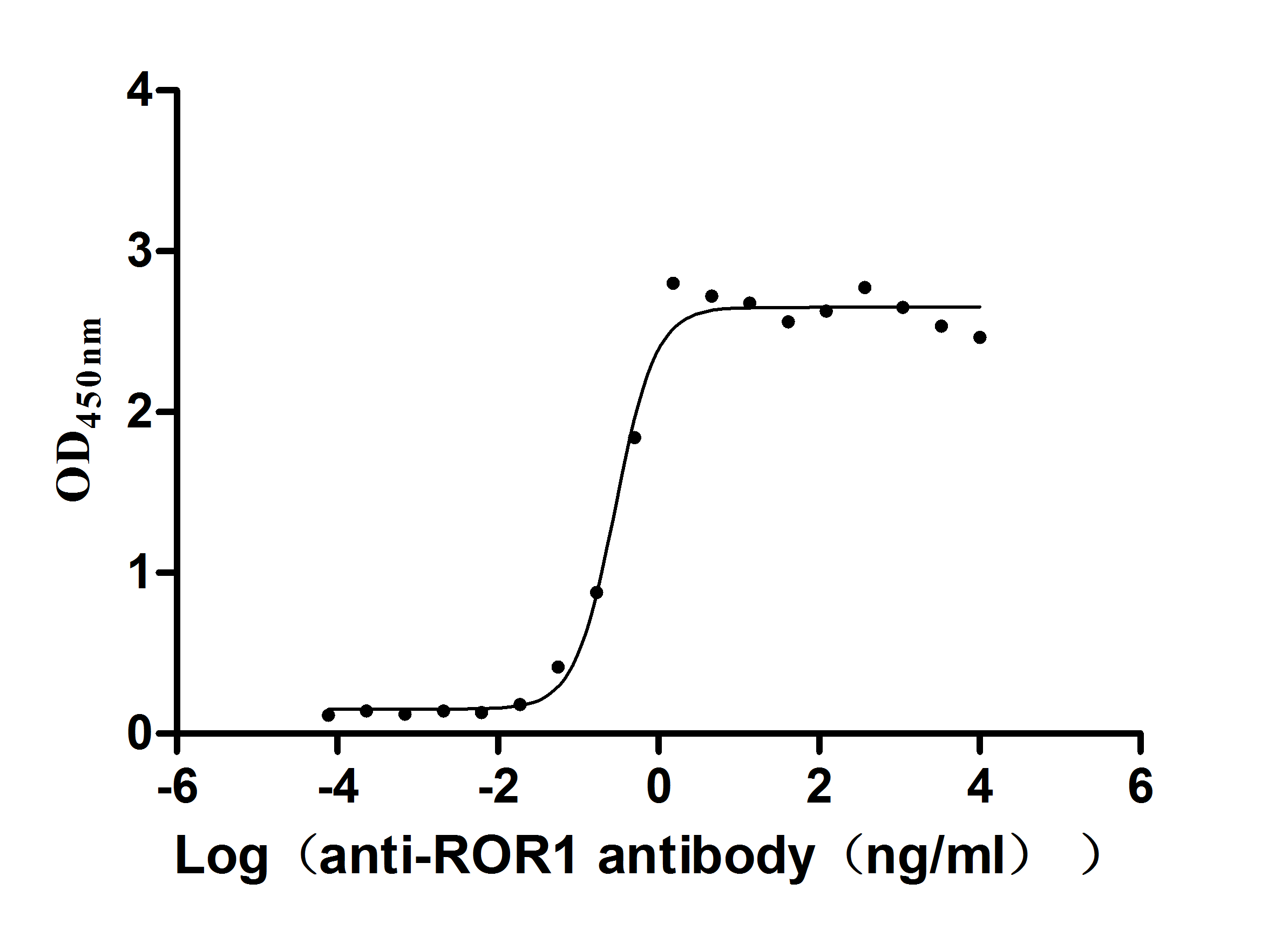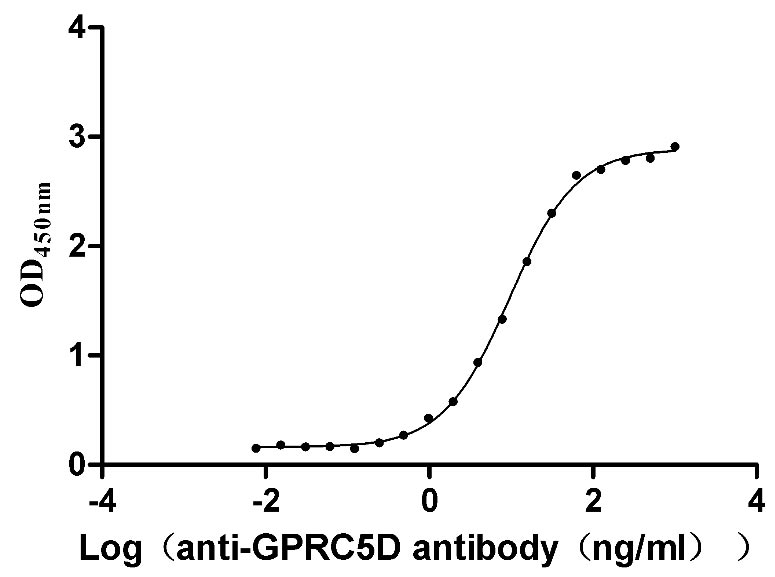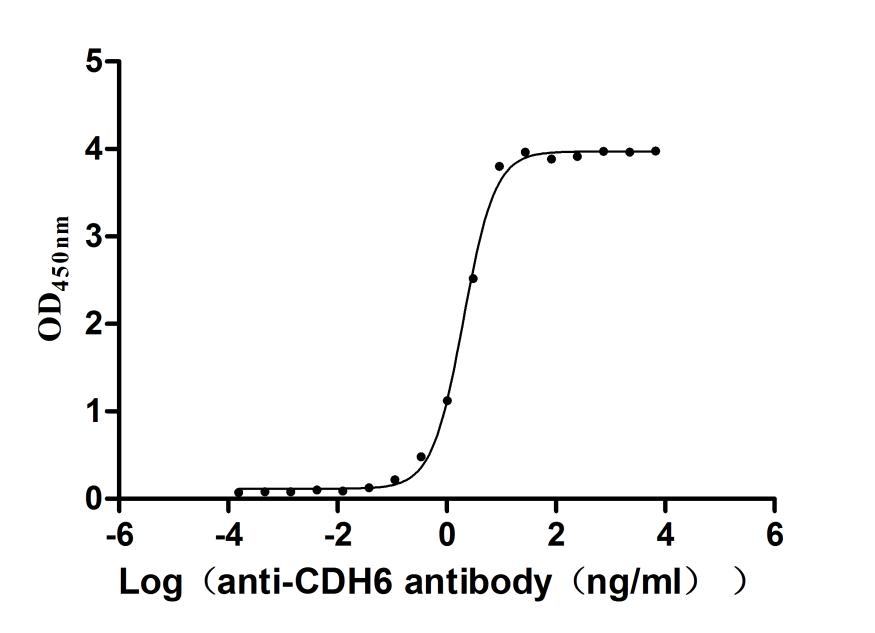Recombinant Human Sequestosome-1 (SQSTM1)
-
货号:CSB-YP615696HU
-
规格:
-
来源:Yeast
-
其他:
-
货号:CSB-EP615696HU
-
规格:
-
来源:E.coli
-
其他:
-
货号:CSB-EP615696HU-B
-
规格:
-
来源:E.coli
-
共轭:Avi-tag Biotinylated
E. coli biotin ligase (BirA) is highly specific in covalently attaching biotin to the 15 amino acid AviTag peptide. This recombinant protein was biotinylated in vivo by AviTag-BirA technology, which method is BriA catalyzes amide linkage between the biotin and the specific lysine of the AviTag.
-
其他:
-
货号:CSB-BP615696HU
-
规格:
-
来源:Baculovirus
-
其他:
-
货号:CSB-MP615696HU
-
规格:
-
来源:Mammalian cell
-
其他:
产品详情
-
纯度:>85% (SDS-PAGE)
-
基因名:
-
Uniprot No.:
-
别名:A170; DMRV; EBI 3 associated protein of 60 kDa; EBI 3 associated protein p60; EBI3 associated protein of 60 kDa; EBI3 associated protein p60; EBI3-associated protein of 60 kDa; EBIAP; FTDALS3; MGC127197; ORCA; OSF-6; Osi; OSIL; Oxidative stress induced like; p60; p62; p62B; Paget disease of bone 3; PDB 3; PDB3; Phosphotyrosine independent ligand for the Lck SH2 domain of 62 kDa; Phosphotyrosine independent ligand for the Lck SH2 domain p62; Phosphotyrosine-independent ligand for the Lck SH2 domain of 62 kDa; PKC-zeta-interacting protein; Protein kinase C-zeta-interacting protein; Sequestosome 1; Sequestosome-1; SQSTM 1; SQSTM_HUMAN; Sqstm1; STAP; STONE14; Ubiquitin binding protein p62; Ubiquitin-binding protein p62; ZIP 3; ZIP; ZIP3
-
种属:Homo sapiens (Human)
-
蛋白长度:Full Length of Isoform 2
-
表达区域:1-356
-
氨基酸序列MAMSYVKDDIFRIYIKEKKECRRDHRPPCAQEAPRNMVHPNVICDGCNGPVVGTRYKCSV CPDYDLCSVCEGKGLHRGHTKLAFPSPFGHLSEGFSHSRWLRKVKHGHFGWPGWEMGPPG NWSPRPPRAGEARPGPTAESASGPSEDPSVNFLKNVGESVAAALSPLGIEVDIDVEHGGK RSRLTPVSPESSSTEEKSSSQPSSCCSDPSKPGGNVEGATQSLAEQMRKIALESEGRPEE QMESDNCSGGDDDWTHLSSKEVDPSTGELQSLQMPESEGPSSLDPSQEGPTGLKEAALYP HLPPEADPRLIESLSQMLSMGFSDEGGWLTRLLQTKNYDIGAALDTIQYSKHPPPL
-
蛋白标签:Tag type will be determined during the manufacturing process.
The tag type will be determined during production process. If you have specified tag type, please tell us and we will develop the specified tag preferentially. -
产品提供形式:Lyophilized powder
Note: We will preferentially ship the format that we have in stock, however, if you have any special requirement for the format, please remark your requirement when placing the order, we will prepare according to your demand. -
复溶:We recommend that this vial be briefly centrifuged prior to opening to bring the contents to the bottom. Please reconstitute protein in deionized sterile water to a concentration of 0.1-1.0 mg/mL.We recommend to add 5-50% of glycerol (final concentration) and aliquot for long-term storage at -20℃/-80℃. Our default final concentration of glycerol is 50%. Customers could use it as reference.
-
储存条件:Store at -20°C/-80°C upon receipt, aliquoting is necessary for mutiple use. Avoid repeated freeze-thaw cycles.
-
保质期:The shelf life is related to many factors, storage state, buffer ingredients, storage temperature and the stability of the protein itself.
Generally, the shelf life of liquid form is 6 months at -20°C/-80°C. The shelf life of lyophilized form is 12 months at -20°C/-80°C. -
货期:Delivery time may differ from different purchasing way or location, please kindly consult your local distributors for specific delivery time.Note: All of our proteins are default shipped with normal blue ice packs, if you request to ship with dry ice, please communicate with us in advance and extra fees will be charged.
-
注意事项:Repeated freezing and thawing is not recommended. Store working aliquots at 4°C for up to one week.
-
Datasheet :Please contact us to get it.
相关产品
靶点详情
-
功能:Autophagy receptor required for selective macroautophagy (aggrephagy). Functions as a bridge between polyubiquitinated cargo and autophagosomes. Interacts directly with both the cargo to become degraded and an autophagy modifier of the MAP1 LC3 family. Along with WDFY3, involved in the formation and autophagic degradation of cytoplasmic ubiquitin-containing inclusions (p62 bodies, ALIS/aggresome-like induced structures). Along with WDFY3, required to recruit ubiquitinated proteins to PML bodies in the nucleus. May regulate the activation of NFKB1 by TNF-alpha, nerve growth factor (NGF) and interleukin-1. May play a role in titin/TTN downstream signaling in muscle cells. May regulate signaling cascades through ubiquitination. Adapter that mediates the interaction between TRAF6 and CYLD. May be involved in cell differentiation, apoptosis, immune response and regulation of K(+) channels. Involved in endosome organization by retaining vesicles in the perinuclear cloud: following ubiquitination by RNF26, attracts specific vesicle-associated adapters, forming a molecular bridge that restrains cognate vesicles in the perinuclear region and organizes the endosomal pathway for efficient cargo transport. Promotes relocalization of 'Lys-63'-linked ubiquitinated STING1 to autophagosomes. Acts as an activator of the NFE2L2/NRF2 pathway via interaction with KEAP1: interaction inactivates the BCR(KEAP1) complex, promoting nuclear accumulation of NFE2L2/NRF2 and subsequent expression of cytoprotective genes.
-
基因功能参考文献:
- Study shows that p62 hijacked NOXA for its degradation during autophagy. PMID: 29758299
- A complex of C9ORF72 and p62 uses arginine methylation to eliminate stress granules by autophagy. PMID: 30022074
- Study demonstrated that the expression of p62 was upregulated in 4nitroquinoline1oxideinduced oral carcinogenesis, accompanied with myeloidderived suppressor cells and regulatory T cells accumulation. PMID: 30272335
- High p62 cytoplasmic expression on its own (p
- the complex structures between the ZZ-domain of p62 and various type-1 and type-2 N-degrons, are reported. PMID: 30120248
- the role of p62 in energy metabolism was studied in fibroblasts. PMID: 28490746
- p62 and ubiquitinated proteins spontaneously coalesce into larger clusters. Efficient cluster formation requires substrates modified with at least two ubiquitin chains longer than three moieties and is based on p62 filaments cross-linked by the substrates. PMID: 29343546
- 27-OH induced autophagy is dependent on the relation between nuclear factor erythroid 2 p45-related factor 2 (Nrf2)-dependent antioxidant response and p62. PMID: 29879549
- our results showed that high CD44 led to p62-associated NRF2 activation in CD44(high) breast CSC-like cells. NRF2 activation contributed to the aggressive phenotype, tumor growth, and anticancer drug resistance of CD44(high) CSCs PMID: 29729523
- results suggested that p62 plays a protective role in adipogenesis of human adipose-derived stromal cells through regulating mitophagy. PMID: 29866118
- The results of the present study demonstrated that p62 may aggravate LPSinduced acute kidney injury in mice by promoting apoptosis in renal tubular epithelial cells. PMID: 29620262
- Study supports HuR's role as an upstream regulator of p62 expression in ARPE-19 cells, helps to understand better the early events in response to a proautophagy stimulus. PMID: 29576851
- Therefore in this review we discuss the role of p62 in autophagy, apoptosis and cancer through its different domains and outline the importance of modulating cellular levels of p62 in cancer therapeutics. PMID: 29738493
- Both the metastatic and recurrent tumor tissues expressed less p62 than the patient-matched primary tumor. A significant inverse correlation has been found between p62 expression and both the disease-free survival and overall survival. PMID: 29699801
- p62 deficiency in stromal fibroblasts promotes resistance to glutamine deprivation by the direct control of ATF4 stability through its p62-mediated polyubiquitination. PMID: 28988820
- AGG is also found to trigger ubiquitination of PUMA which in turn interacted with p62 for prompting mitophagy suggesting that AGG turns on PUMA-mediated mitophagy in U87MG cells in both p62-dependent as well as in p62-independent manner PMID: 29229477
- The results suggest that p62 may be an effective predictor of prognosis and a potential target for therapy in osteosarcoma. PMID: 29617702
- The model reveals a compensatory autophagic pathway, mediated by a SQSTM1/p62-dependent clearance of accumulated polyubiquitinated proteins. In addition to mediating the sequestration of ubiquitinated cargos into phagophores, the precursors to autophagosomes, SQSTM1 is also important for polyubiquitinated aggregate formation upon proteasomal inhibition. PMID: 28792301
- ESI induces protective autophagy of lung cancer cells through Nrf2-p62-keap1 feedback loop PMID: 28617433
- IFN-gamma induces activated but insufficient autophagy and thus contributes to a degree to p62-dependent apoptosis of nasal epithelial cells in chronic rhinosinusitis with nasal polyps. PMID: 28258963
- The underling mechanism of autophagy/p62/Nrf2 pathway discovered may provide a new direction for drug development. PMID: 28737825
- Study show the proteasome autophagy mechanism is mediated by the p62/SQSTM1 adapter and requires its ubiquitin-associated domain. Independently, p62 serves also as a shuttling protein for ubiquitinated substrates, using its PB1 domain. This places p62 in a pivotal position where under certain conditions it binds to the proteasome as a protease, whereas in other conditions it recognizes the proteasome as a prey. PMID: 27791183
- The study describes a previously uncharacterized cellular response induced by heme: the formation of p62/SQSTM1 aggregates containing ubiquitinated proteins in structures known as aggresome-like induced structures (ALIS). This action is part of a response driven by the transcription factor NRF2 to the excessive generation of reactive oxygen species induced by heme. PMID: 27821769
- The data identify an intricate mechanism of hepatitis C virus-dependent inhibition of Nrf2/ antioxidant response elements-mediated gene expression which counteracts serine 349-phosphorylated p62-induced activation of Nrf2. PMID: 28673615
- Results identified SQSTM1, a regulator of apoptosis and autophagy, to be hyper-phosphorylated and associated with development of cisplatin resistance in high-grade serous ovarian cancer. PMID: 28455291
- p62 immunoreactivity was detected in 11% of colorectal adenoma and 31% of the adenocarcinoma cases, and almost negligible in the normal epithelium. p62 promotes cell proliferation in colorectal carcinoma cells, was significantly associated with synchronous liver metastasis in the colorectal carcinoma cases, and was an independent adverse prognostic factor for overall survival in the colorectal cancer patients. PMID: 28544335
- NEDD4 is an autophagic E3 ubiquitin ligase that ubiquitylates SQSTM1, facilitating SQSTM1-mediated inclusion body autophagy. PMID: 29021346
- SQSTM1/p62 senses the saturation of reactive oxygen species (ROS)-buffering systems, and that this redox-sensitivity is important to increase autophagy, and thus ensure the survival of cells under oxidative stress conditions. PMID: 29343728
- This study is the first to show a cytoplasmic function of claudin 1 as an autophagy regulator and provides the evidence that claudin 1-mediated autophagy regulation is an integral part of the mechanism by which claudin 1 regulates cancer progression. PMID: 29307823
- The autophagy induced by 2-PCPA requires LC3-II processing machinery..2-PCPA treatment induces the change of global gene expression program, including a series of autophagy-related genes, such as SQSTM1/p62. Taken together, our data indicate that KDM1A/LSD1 inhibitors induce autophagy through affecting the expression of autophagy-related genes and in a BECN1-independent manner PMID: 28800922
- The results of this study reflect that Frontotemporal Dementia /SQSTM1 carriers show a right atrophy pattern in prefrontal-orbital-insular regions with relative preservation of the temporal lobes different from that observed in Sporadic Frontotemporal Dementia. PMID: 27163810
- the L341V mutation limits the critical step of SQSTM1 recruitment to the phagophore PMID: 27158844
- Endogenous p62 undergoes E2-dependent ubiquitylation during upregulation of Ubiquitin (Ub) homeostasis, a condition termed as Ub(+) stress, that is intrinsic to Ub overexpression, heat shock or prolonged proteasomal inhibition by bortezomib, a chemotherapeutic drug. PMID: 28322253
- LC3 and p62/SQSTM1 have roles in early-stage non-small cell lung cancer PMID: 27250032
- LC3B and p62 have roles in autophagy in esophageal adenocarcinoma PMID: 27250034
- ALS-FTLD associated mutations of SQSTM1 disrupt Keap1 binding and disable Nrf2 signaling. PMID: 27554286
- analysis of soluble SQSTM1 complexes and soluble complexes formed between SQSTM1 oligomers and LC3 using a combination of fluorescence microscopy-based biophysical approaches in living cells PMID: 27442348
- CAL suppresses the expression of pro-inflammatory cytokines via p62/Nrf2-linked HO-1 induction in RASFs. PMID: 27678042
- Vps34 stimulates tumor development mainly through PKC-delta- activation of p62. PMID: 28846113
- casein kinase 1 phosphorylates the SQSTM1 S349 residue when harmful proteins accumulate under HSF1 stress PMID: 27846364
- SQSTM1 binds and inhibits E3 ligase RNF168s activity, which is essential for H2A ubiquitination PMID: 27791533
- this study proved that SYVN1 enhances SERPINA1(E342K)/ATZ degradation through SQSTM1-dependent autophagy and attenuates SERPINA1(E342K)/ATZ cytotoxicity. PMID: 28121484
- The s show that ufmylation regulates SQSTM1 by eliciting a cell type-specific endoplasmic reticulum stress response which induces SQSTM1 expression and results in its accumulation in the cytosol. PMID: 27351204
- TRIM11 suppresses AIM2 inflammasome by degrading AIM2 via p62-dependent selective autophagy. PMID: 27498865
- These data define that YOD1 antagonizes TRAF6/p62-dependent IL-1 signaling to NF-kappaB. PMID: 28244869
- Data show that p62 interaction with LC3, leading to the delivery of p62 and its cargoes to the autophagosome. PMID: 28740232
- These results demonstrate a novel SQSTM1 regulatory network that promotes a nickel-induced tumorigenic effect in human bronchial epithelial cells. PMID: 27467530
- Thyroid hormone promotes selective autophagy via induction of DAPK2-SQSTM1 cascade, which in turn protects hepatocytes from diethylnitrosamine-induced hepatotoxicity or carcinogenesis. PMID: 27653365
- P62 functions as a tumour metastasis promoter. PMID: 28968743
- Silence of p62 promotes apoptosis induced by mitochondrial depolarization. PMID: 28433685
显示更多
收起更多
-
相关疾病:Paget disease of bone 3 (PDB3); Frontotemporal dementia and/or amyotrophic lateral sclerosis 3 (FTDALS3); Neurodegeneration with ataxia, dystonia, and gaze palsy, childhood-onset (NADGP); Myopathy, distal, with rimmed vacuoles (DMRV)
-
亚细胞定位:Cytoplasm, cytosol. Late endosome. Lysosome. Cytoplasmic vesicle, autophagosome. Nucleus. Endoplasmic reticulum. Nucleus, PML body. Cytoplasm, myofibril, sarcomere.
-
组织特异性:Ubiquitously expressed.
-
数据库链接:
HGNC: 11280
OMIM: 167250
KEGG: hsa:8878
STRING: 9606.ENSP00000374455
UniGene: Hs.587290
Most popular with customers
-
Recombinant Human Receptor tyrosine-protein kinase erbB-2 (ERBB2), partial (Active)
Express system: Mammalian cell
Species: Homo sapiens (Human)
-
Express system: Mammalian cell
Species: Homo sapiens (Human)
-
Recombinant Human G-protein coupled receptor family C group 5 member D (GPRC5D)-VLPs (Active)
Express system: Mammalian cell
Species: Homo sapiens (Human)
-
Recombinant Mouse Cadherin-6(Cdh6),partial (Active)
Express system: Mammalian cell
Species: Mus musculus (Mouse)
















